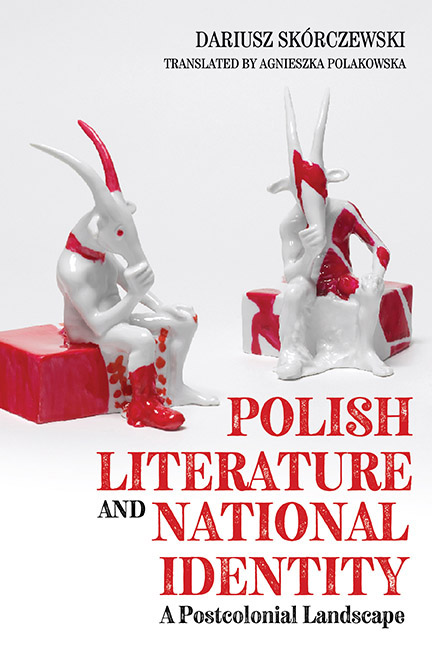Book contents
- Frontmatter
- Dedication
- Contents
- Acknowledgments
- Prologue: How It All Began
- 1 Through the Lens of Humanism, with a View to Transcendence
- 2 Postcolonialism in Poland
- 3 National Identity in a Postcolonial Framework: Necessary Clarifications and Opening Suggestions
- 4 Literature as Compensation: Comprador Intelligentsia vis-à-vis the Hegemonic Discourse—Preliminary Theoretical Remarks
- 5 Confronting the Romantic Legacy
- 6 The Natives’ Exclusion by the Empire's Poet? (Adam Mickiewicz, The Crimean Sonnets)
- 7 Identity as an Object of Inquiry (Pawel Huelle's Castorp)
- 8 The (East-)Central European Complex (Andrzej Stasiuk, On the Road to Babadag and Fado)
- 9 Colonized Poland, Orientalized Poland: Postcolonial Theory and the “Other Europe”
- 10 Slavic Issues with Identity: Marginal Notes to Maria Janion's Uncanny Slavdom
- 11 The Melancholia of Borderlands Discourse
- Afterword: Three Warnings
- Notes
- Bibliography
- Index
8 - The (East-)Central European Complex (Andrzej Stasiuk, On the Road to Babadag and Fado)
Published online by Cambridge University Press: 25 March 2020
- Frontmatter
- Dedication
- Contents
- Acknowledgments
- Prologue: How It All Began
- 1 Through the Lens of Humanism, with a View to Transcendence
- 2 Postcolonialism in Poland
- 3 National Identity in a Postcolonial Framework: Necessary Clarifications and Opening Suggestions
- 4 Literature as Compensation: Comprador Intelligentsia vis-à-vis the Hegemonic Discourse—Preliminary Theoretical Remarks
- 5 Confronting the Romantic Legacy
- 6 The Natives’ Exclusion by the Empire's Poet? (Adam Mickiewicz, The Crimean Sonnets)
- 7 Identity as an Object of Inquiry (Pawel Huelle's Castorp)
- 8 The (East-)Central European Complex (Andrzej Stasiuk, On the Road to Babadag and Fado)
- 9 Colonized Poland, Orientalized Poland: Postcolonial Theory and the “Other Europe”
- 10 Slavic Issues with Identity: Marginal Notes to Maria Janion's Uncanny Slavdom
- 11 The Melancholia of Borderlands Discourse
- Afterword: Three Warnings
- Notes
- Bibliography
- Index
Summary
Andrzej Stasiuk has been called “an incorrigible partisan of Eastern European provincialism, which he traces passionately in the most peripheral regions of the Carpathians in two best-selling travelogues: On the Road to Babadag (Jadąc do Babadag; 2004) and Fado (2006).” Stasiuk, whose style has been compared by critics to that of Jack Kerouac, is known for his fascination with the European Orient—Eastern Europe—and aversion to the Occident— Western Europe. Given the dominance of pro-European sympathies in post- 1989 Polish society, his position is surprising and provocative, and it can be seen as a kind of regression and contestation of European civilizational ideals. What are the reasons behind these idiosyncrasies of Stasiuk's worldview?
Stasiuk's readers discover multiple signs of contemporary postcolonial societies within both these travelogues: the trauma of foreign hegemony, the burden of economic underdevelopment, pessimism, and passivity. These are only some of the components that constitute the complex, or rather an entire network of complexes, that these societies are trying to overcome. These complexes relate to East-Central Europe's sense of inferiority toward the West, which existed as a mythical place for East-Central Europeans during the entire Communist period: an oasis of carefree life and economic prosperity, the object of envy and aspirations both open and concealed. A reversal of this main, Western vector of cultural orientation in Polish mentality and literature is consistent with a contemporary and global postcolonial trend. From this perspective, Stasiuk is a writer who contests the West in a manner similar to those of writers from other parts of the postcolonial world. Does it mean that Stasiuk offers this rather than another vision of the world simply because he is following a trend?
Stating that Stasiuk's narrations have long revolved around Central and Eastern European issues strikes a formulaic chord. The Slovenian Vilenica International Literary Prize that Stasiuk received in 2008 was a sign of recognition both of the place post-Soviet, post-totalitarian, and postcolonial East-Central Europe occupy in his work and of the promotion of this location in other parts of the continent and beyond it. The Austrian State Prize for European Literature, awarded to him in 2016, was the first such prize to be given to a Polish writer after the demise of Communism.
- Type
- Chapter
- Information
- Polish Literature and National IdentityA Postcolonial Landscape, pp. 160 - 175Publisher: Boydell & BrewerPrint publication year: 2020

